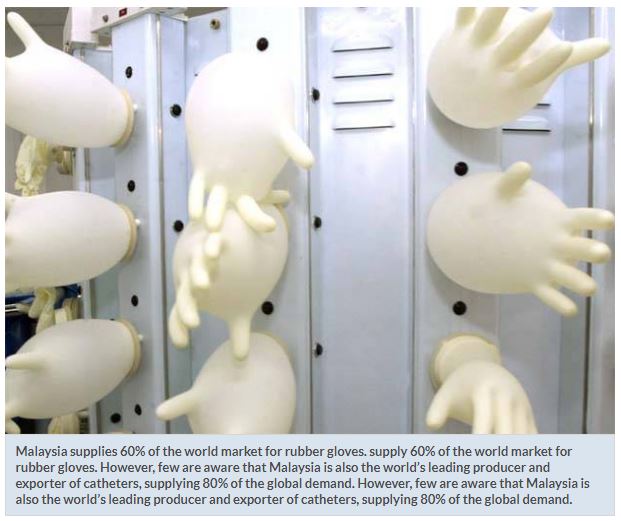Medical devices sector deemed important growth area for Malaysia
PETALING JAYA: The medical devices industry in Malaysia is dominated by companies engaged in the production of medical gloves and other medical disposable products. The feat of Malaysian glove players is well-known – they supply 60% of the world market for rubber gloves.
However, few are aware that Malaysia is also the world’s leading producer and exporter of catheters, supplying 80% of the global demand.
Currently, over 90% of medical devices manufactured in Malaysia are exported. Besides that, more than 30 multinationals have made Malaysia their offshore manufacturing location.
These would include names such as Abbott, Agilent, B. Braun, Ambu, Ciba Vision and many others.
Today in Malaysia, there are approximately more than 200 medical devices manufacturers, mainly small and medium enterprises manufacturing medical gloves.
However, the industry also includes higher value-added and technologically advanced products such as cardiac pacemakers, stents, orthopaedic implantable devices, and electromedical, therapeutic and monitoring devices.
Big local listed producers include known names such as Top Glove Corp Bhd  , Hartalega Holdings Bhd
, Hartalega Holdings Bhd  and Kossan Rubber Industries Bhd
and Kossan Rubber Industries Bhd  . Other smaller local listed medical players include precision machine components player DUFU TECHNOLOGY CORP BHD
. Other smaller local listed medical players include precision machine components player DUFU TECHNOLOGY CORP BHD  and high-tech wire and cable manufacturer Supercomnet Technologies Bhd
and high-tech wire and cable manufacturer Supercomnet Technologies Bhd  (Scomnet).
(Scomnet).
Both Dufu and Scomnet were Bursa Malaysia’s best-performing stocks in 2018.
Dufu was among Bursa Malaysia’s 2018 top-50 absolute market capitalisation gainers. Its share price rose some 247% from 71 sen to RM2.45 in just less than seven months.
Meanwhile, Scomnet was the second top gainer, with its share price surging by 104.4% from 34 sen to 70 sen in 2018.
For 2019, Dufu is up some 62% on a year-to-date basis, while Scomnet is up 38%.
Just why are medical devices companies doing so well?
In its website, the Malaysian Investment Development Authority (Mida) said that the medical devices sector has been designated as one of the ‘3+2’ high-growth sub-sectors under the Eleventh Malaysia Plan.
“It is an important growth area, which includes higher value-added and technologically advanced products, such as cardiac pacemakers, stents, orthopaedic implantable devices, electro-medical, therapeutic and monitoring devices, ” said Mida.
Mida reported that in 2017, the industry recorded total approved investments of RM2.2bil across six new projects worth RM69.4mil, and 19 expansion and diversification projects worth RM2.1bil.
Compared to 2016’s figures of RM2.9bil in investments across 41 approved projects, this is an indication that the medical devices industry is successfully attracting more strategic investments, with higher investments per project on average.
Foreign investors demonstrated their confidence in the future of the industry by contributing RM1.6bil (72.7%) worth of investments, while domestic direct investments brought in RM600mil (27.3%).
In the case of Denmark-listed Ambu, much attention has been on this medical technology company, especially with its share price rising by some 5,000% over the last decade.
Ambu is backed by one of Denmark’s richest billionaires, Niels Peter Louis-Hansen.
Ambu’s share price has been rocky this year, following cuts to its growth prospects twice this year.
Headquartered in Copenhagen in Denmark, Ambu has a manufacturing site and a research and development site in Malaysia besides the US and China.
In Malaysia, Ambu is located in Penang, and has invested more than RM160mil in Malaysia since it started production in 1995.
Source: https://www.thestar.com.my/business/business-news/2019/09/02/medical-devices-sector-deemed-important-growth-area-for-malaysia#SoWVA7YBib1RmD4u.99


 English
English




